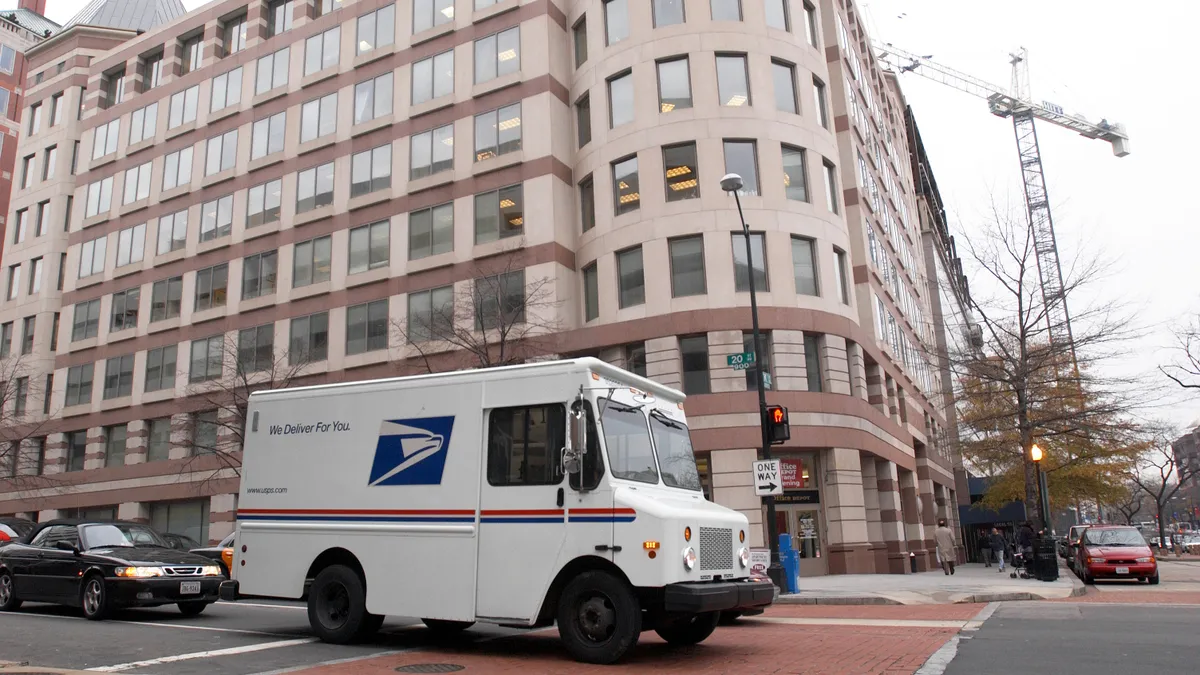On Sept. 24, the Universal Postal Union (UPU) will conduct perhaps its most consequential meeting in more than 100 years. The UPU, a global organization backed by a treaty that sets shipping rates from country to country, has a Congress that meets every four years. But an extraordinary Congress meeting of the full 192-country membership only meets when two-thirds of the members agree to do so.
The U.S. withdrawal from the UPU is the occasion for the third such meeting ever to be called.
The Trump administration announced its intention to withdraw from the UPU in October 2018, pending negotiations with the other members to form new bilateral and multilateral agreements.
The controversy around the UPU treaty, as it stands, swirls around the contention that the treaty makes it very easy and relatively cheap to ship any item under 4.4 pounds into the U.S. from developing countries — so much so that U.S.-based shippers sometimes can’t compete.
"This outdated arrangement contributes significantly to the flood of counterfeit goods and dangerous drugs that enter the country from China," said National Association of Manufacturers (NAM) President and CEO Jay Timmons in a statement supporting the move back in October.
Now, Supply Chain Dive has learned the United States Postal Service (USPS) sent notices to organizations with negotiated service agreements (NSA) with USPS, warning the international rates in their contracts may be null after Sept. 30 this year.
"We are making every effort to try to minimize any disruption that may be occasioned by this change and are working to devise solutions that promote continuity of operations, as well as alternative solutions for the future," reads an email from a USPS official to an NSA holder dated Aug. 22, 2019 obtained by Supply Chain Dive.
The email goes on to say the USPS is "giving notice of termination of the Agreement," referring to the receiving organization's service agreement, out of an "abundance of caution."
"Please note that your entity will no longer be eligible for discounted rates under the Agreement beginning on October 1, 2019, unless the Postal Service provides further notice regarding this matter to you," the email concludes.
Industry sources confirmed several other organizations with USPS service agreements received similar messages.
A USPS spokesperson did not confirm the notices to Supply Chain Dive when asked to do so, but did provide the following statement as to the demands on the table at the upcoming UPU Congress meeting:
"The Postal Service is working closely with the State Department, the Postal Regulatory Commission and other stakeholders to implement self-declared rates. While the United States is preparing to leave the UPU in October, if a solution can be found that eliminates the economic distortion caused by the current terminal dues system on U.S. businesses, then the United States will continue its participation in the UPU," the spokesperson wrote in an email.
What’s at risk this peak season?
Glenn Gooding, president of iDrive Logistics, which has an NSA with USPS, told Supply Chain Dive he expected changes to come with the UPU withdrawal, but the canceling out of existing negotiated rates is a surprise. NSAs are generally negotiated yearly and often in January after the holiday shopping season has ended. These abrupt changes could hit shippers right at the start of peak season for e-commerce.
The situation surrounding the UPU contains echoes of the trade war. Gooding said the UPU rates certainly need reform — they were conceived before China industrialized and became the manufacturing power house it is today. But the hard-line, all-or-nothing approach is likely to leave U.S. businesses in an uncertain environment at a key time, even though they may agree with the intended outcome.
A presentation by Giselle Valera, executive director of continuity of global operation at USPS, dated June 19, 2019, reveals the level of uncertainty around the issue of U.S. postal treaties going forward. Essentially the slides convey that the USPS will continue normal function, unless it doesn’t.
"USPS intends to keep our major international products and services for export," but "geographic coverage" may change. "Rates changes are likely to follow the current, normal, annual cycle schedule unless costs increase significantly," the slides read.
A USPS spokesperson told Supply Chain Dive, "Because the U.S. may no longer be a member of the UPU by mid-October 2019, the Postal Service is undertaking parallel efforts to ensure the continued exchange of international mail items even if the negotiations to remain in the UPU are unsuccessful. No matter the outcome with the UPU, the Postal Service is committed to remaining in the international mailing business."
But shippers and postage sellers are concerned. EBay has even created a digital form letter for its sellers to send to their Congresspeople to advocate for staying in the UPU.
"If the US withdraws, small businesses that sell online to customers around the world could see service disruptions and dramatically increased costs for shipping through the US Postal Service - all heading into the holiday season. Congress needs to hear from you about how small businesses would be hurt if the US goes through with this plan. We encourage you to take advantage of these easy-to-use tools to contact your representatives and stop the US from withdrawing from the UPU," reads EBay’s call to action.
If the U.S. withdraws from the UPU in October, U.S. shippers will lose their default contracts with the postal agencies of the world. Global e-commerce will by no means stop, but shippers will be on their own, to an extent, when it comes to finding the best price for international service in the marketplace until the U.S. can negotiate bilateral and multilateral deals.
Such deals with European allies, said Matthew White, a strategist at iDrive Logistics, would likely be relatively easy to come to, but negotiating with China would not happen in a vacuum.
"China is not going to view this as the U.S. asking for a fair playing field in terms of international shipping. They're going to look at this as a direct assault on them in terms of trade and to some extent it is," White told Supply Chain Dive.
Getting ahead of the change
Some organizations are already preparing for such an eventuality. Stamps.com, a major reseller of postage to small e-commerce sellers, has developed a new service it is ready to offer the moment the U.S. withdraws from the UPU, if it comes to that.
"In anticipation of the possibility that the United States leaves the Universal Postal Union (UPU), Stamps.com has introduced two new shipping services under the GlobalPost brand name that are not reliant on U.S. relationships with the UPU," Vice President of Online Marketing for Stamps.com Eric Nash told Supply Chain Dive via email.
The service will offer "similar transit times, customs clearance process and competitive rates," said Nash. On the company’s second quarter earnings call earlier this month, Stamps.com CEO Ken McBride described this effort as diversifying "from a domestic single carrier business model to our global multi-carrier business model."
Gooding and iDrive Logistics are offering solutions through other carriers like DHL and FedEx to ensure continuity of service, though Gooding conceded these options will inevitably be more expensive — possibly double or even triple pre-withdrawal rates.
All shippers, said Gooding, need to seek out USPS alternatives immediately and take another look at their consumer-facing shipping policies, in order to be ready for peak season.






















